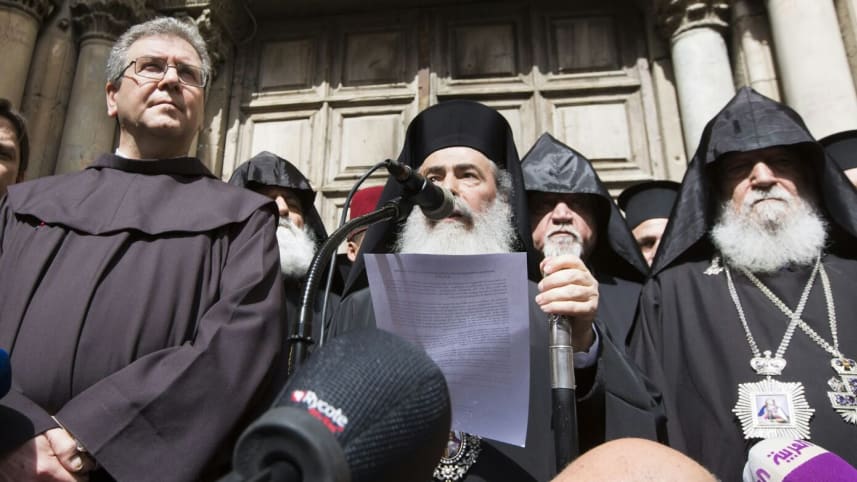After rare move by heads of churches in Jerusalem in protest of legislation to expropriate church lands, ministers postpone debate on bill
In a rare move, the Church of the Holy Sepulchre was closed on Sunday until further notice in protest of Israeli government legislation and new city tax policy. The decision was announced on Sunday by the churches sharing the management of the property, the Greek Orthodox, Roman Catholic and the Armenian Apostolic
A sign on the Church of Holy Sepulchre says “enough is enough, stop the persecution of churches.’ניר חסון
The heads of Christian churches in Jerusalem announced the move as the Knesset’s Ministerial Committee for Legislation was set to discuss a bill that would allow the state to expropriate land in Jerusalem sold by the Greek Orthodox and Roman Catholic churches since 2010. After the church was closed, the ministerial panel decided to postpone the debate on the bill.
The churches are also protesting the Jerusalem municipality’s new policy on municipal tax payments for church property.
The heads of the churches – Greek Orthodox Patriarch Theophilos III, Custos Francesco Patton and Armenian Patriarch Nourhan Manougian – released a statement attacking the legislation and the recent move by the city, which they labeled as a “systematic campaign against the Churches and the Christian community in the Holy Land.
“The systematic campaign… reaches now its peak as a discriminatory and racist bill that targets solely the properties of the Christian community in the Holy Land is being promoted,” the statement said. “This reminds us all of laws of a similar nature which were enacted against the Jews during dark periods in Europe.”
The ministerial panel is set to discuss the church lands bill, which is designed to put an end to most of the major land sales carried out by the churches to private real estate companies. Most of the lands involved, about 500 dunams (125 acres) are in the centrally located neighborhoods of Rehavia, Talbieh and Nayot. Some of the residents living on the land have protested the move, which would force them to evacuate when the lease on the land ends.
The bill would authorize the finance minister, with the approval of the Knesset Constitution, Law and Justice Committee, to expropriate lands sold since the beginning of the decade in return for compensation for the companies that bought the land.
The bill is quite unusual in terms of Israeli jurisprudence, and because it applies retroactively to land sales that have been finalized. It limits the property rights of the churches and private firms that bought the land.
Church leaders have made it clear a number of times that they consider this a serious violation of their property rights and the status quo. Leaders have also announced they will fight the law both legally and diplomatically.
Meanwhile, church representatives have accused Jerusalem Mayor Nir Barkat of breaching international treaties after the municipality said it planned to collect 650 million shekels ($186 million) in back taxes owed by churches and international bodies with property in the city.
So far, church property has been exempt from paying property tax, but the municipality last month said it has begun collecting municipal taxes from offices, schools, and buildings designated for various purposes and owned by the churches. Municipal taxes however would not be collected from places of worship, which are exempt from taxation.


